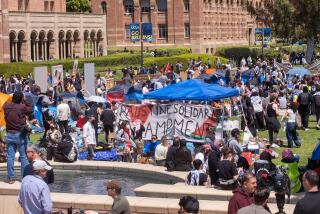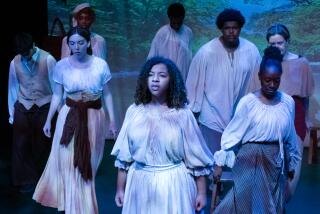Nudity Scene Compromise Offered : Chapman Dean Still Backs Ban
- Share via
Despite a lively campus protest Monday against the banning of a nude scene from a student performance at Chapman College, the top school official who issued the ban said he still opposes the five-minute segment featuring two students standing naked on stage.
Jay Moseley, the college’s vice president for academic affairs, also said it was unlikely that he would support a new student proposal that “The Coloring Box,” as the work is called, be offered for a specially invited audience of people associated with the college, rather than the public performances scheduled for May 18-20. Moseley banned the scene on March 10, saying it breaches the school’s “value-centered” tradition.
“My reading of it is that it isn’t really a compromise,” said Moseley of the special performance proposal. The idea came last week from the author of the censored work, senior Joel Moffett.
“He’s saying, ‘Let’s have a showing that will include faculty, students and their friends.’ I really don’t see what the difference is,” Moseley said. “If I were to make a decision again right now, I’d say we’ve decided.”
Moseley was interviewed after an orderly, one-hour protest by students and about 20 faculty members--some of whom said they support Moffett. The group listened to a series of speeches, including one by student body president David Nielsen that criticized the ban. Several students in the crowd wore paper bags on their heads to symbolize censorship, and others carried signs declaring “How Free is Free?” and “Where Are Our Rights?” Chapman President G.T.(Buck) Smith, who endorsed Moseley’s ban, said he will announce his decision about the compromise on Wednesday.
“I would still like a day to see what new points of view are being expressed in this matter,” Smith said Monday, calling the ban one of the school’s most controversial recent issues.
Chapman, founded in 1861 by the Christian Church (Disciples of Christ), is a private college in Orange with 2,100 students.
Smith was busy much of Monday with a board of trustees meeting, held in a campus building not far from where about 150 students gathered on a sun-drenched lawn. Smith and the trustees who were interviewed said the ban was not a topic at the meeting. Yet student speakers outside charged that the ban stems from the Chapman administrators’ fear of how the school’s supporters in conservative Orange County might react.
“The real issue . . . involves what this college really stands for, and just as importantly, to whom,” said student leader Nielsen. “Are we a profit-driven, money-making business, or are we a value-centered institution of learning?
“Why is it that art students are allowed to paint nude models, yet theater students cannot use nudity in their work?” Nielsen asked. “If displayed nudity really does go against the values of this college, then we are being hypocritical. . . . If it is because theatrical work is a “public experience” in the sense that the potential money-giving public can see it, then we are being even more hypocritical.”
Several members of the Chapman faculty said the nude scene should have been permitted.
“I thought Dean Moseley’s decision was unfortunate,” said Jay Boylan, chairman of the communications department, where Moffett is a student. “I thought the play was fairly innocuous and not something that should be changed.”
Moffett’s play is about the struggle for identity and rebirth, and the nakedness is intended to express the characters’ freedom from societal norms. The play is the first by a Chapman student involving nudity, and Moseley has said that the ban established a general principle barring nudity in future campus performances.
Some faculty members said the administration’s decision-making was too autocratic, and Virginia Carson, a biology professor who is also chairman of the faculty, said about 30 professors out of Chapman’s 100-member faculty attended an informal meeting last Thursday to discuss the ban.
“There are some who are concerned” about how the decision was handled, Carson said. “I think we’ve decided that there will have to be some procedural changes so that faculty and students will have some say in what happens in the future.”
Moseley said he conferred with some faculty members about the ban. But he said he would be more systematic from now on. “This is the first really sensitive artistic-freedom issue this school has had, and there will be a lot more discussion of it,” he added. To indicate its openness, Moseley said, the administration is holding meetings with students and faculty members on Thursday and Friday to discuss the ban.
Moffett said that forums and talk about openness are fine but added that protests, forums and new procedures are not enough to satisfy him. “There is only one result that would make me consider all this a success,” he said. “To have the performance the way I wanted it.”
More to Read
Sign up for Essential California
The most important California stories and recommendations in your inbox every morning.
You may occasionally receive promotional content from the Los Angeles Times.













